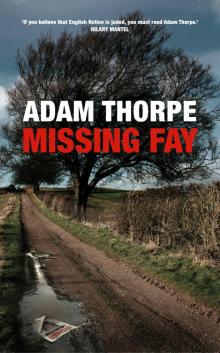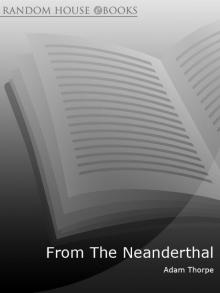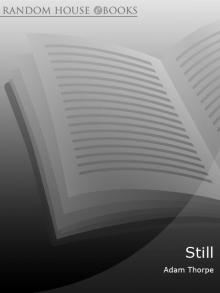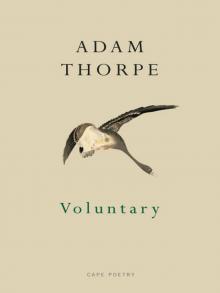- Home
- Adam Thorpe
Hodd Page 15
Hodd Read online
Page 15
Yet as I rode out with Robert Hode to Notyngham upon such a fair day as maytime alone bringeth, with the sky blue-bright as glass and the air delectable, and the wayside full fair with flowers, drawing innumerable butterflies upon them – such a day that lifts and gladdens the heart and turns even the waste moor into a portion of that eternal bliss that awaits the goodly, so lovely lies the heather and the turf, and fragrant as incense, and mantled by the songs of birds – I did feel myself a rival to him in love, and a worm turned in my brain.
Many there were upon the road, including some twenty singing pilgrims with great staffs and leaden medals on their caps, so that there was a continual hum hither and thither, and a creaking of carts whose drivers oft cast into our way many detestable oaths, that I was well used to by now. My master’s only disguise was a blue pelisse,222 with a large capuchon attached, larger even than his usual hood, for it had belonged to a fat merchant; for my part, I wore the surcoat of a page, of a light-green hue. My thoughts were not upon the danger of our mission, but upon a pair of bluish-grey eyes and the moistness of vermeil lips, holier to kiss than the Book to my inflamed mind …
A missing leaf, likely to have been torn out purposely, brings us to the central market-square of thirteenth-century Nottingham, presumably on the morning of the next day.
… green cheeses and three cart mares beside a stall selling opium, rhubarb and precious camphor from Venice, guarded by two burly ruffians with great snarling dogs. My master and myself went unre-marked, for there were all manner of folk, sometimes mere shadows within the smoke from the roasting capons, geese and suchlike, and the steam from the oxen dung (for it was a sharp morning); and few anyway had seen Robertt Hod’s face in full, so low did he wear his hood when robbing.
I was so much afraid we would be taken, that I could scarce hold the great bow, and the din was very great and horrible after the forest, whose wood-ways were so calm, in spite of the forty or fifty felons within, that the quietest birdsong might be enjoyed. On passing the surgeon-barber’s chair, where a fat wretch was being deprived of his tooth, and Hodde stopping there in the crowd for the entertainment, the tooth being stuck fast and resisting the pincers (though three among them held the man down), I had espied the Bishop [of Yorke’s] man among the folk watching and laughing, and hid myself behind a stall of tethered hens that pecked my toes, till the tooth was plucked free on a great huzzah.
I drew my capuchon well over my head, yet so large was Hode’s [capuchon], that he more resembled a mendicant or the figure of Death in the myracles, than any outlaw. The principal entrance to the church was by the north, on the market side, on account of the masons enlarging the south porch.223 Hodd gave to each of the cripples in the [church] porch a generous amount of pennies; one there was, so horribly deformed in the legs, dragging himself o’er the filth of the square on two low crooks, that all who saw him expressed wonder; one woman was shouting shrilly without cease that his legs imitated a holy cross and that it was a miracle, but she was mad, and milk-white in one eye. Another beggar’s visage was measled over with whelks and botches (though not a leper’s, for there was no stench) that hid it quite, so that none knew whether the unfortunate beneath was male or female, even when the creature uttered its plaint; unlike the last, who was a comely young woman, but frouncen like beech bark on her brow, for she had lost her only daughter down a well – yet said not a single ‘Gramercy’ when we cast her a penny.
Within the church, where it was dark after the sunlight, and so full of straw-dust that many coughed over the priest’s hurried words, expelling thus a thick vapour of garlic that e’en the sacred air could not dilute, Hodde’s face in its cloth cavern was but a glint of moistness now and again, that was one or other of his lustrous eyeballs.
The church was noisy, it being market day, for the carousal that always attends such, had part entered the sacred building, and there … [hiatus in the MS ].
… She was dressed in a rich cotte224 brocaded with dancing lions in silver, fastened above the glistening folds with a jewelled belt, and a plain cap and wimple not fretted with any decoration. She walked upon the arm of her father, whose cotte reached only to his calf,225 with a servant beating back with a knobbed club those persons thronging the nave, and so stoutly he might have broken their bones. How strange it was, to see her there among the rabble! How wide did we all gape, not harkening any of the sacred words, that rang to me then (with Satan’s persuasion) as a tin coin doth on stone!
She and her father had chairs reserved for them to one side, near the pulpit, with other notable persons of the town that their legs might not grow weary, though the finest and greatest chair next to hers was unoccupied; that portion being raised upon a dais, we could watch her clearly, though Hode pressed forward through the throng to be nearer, while I mounted upon the base of a thick pillar a fair way up the nave, to see above the myriad heads. Then waxen tapers being lit for the mass, and the bishop’s cope of most costly workmanship, with a morse226 of silver and gems, glittering among the other precious choir-copes as [the clerics] processed to the chantry, a lustre was sent forth upon her face: she was like an image of our spotless Lady herself.
Verily, I believed then in my master’s horrible words, that he was to make a sacred union with her, that would bring about the end of days. For in the unholy tumult of the church, like a sheephouse full of bleating beneath where I pillar-perched, I was struck by a twofold certainty: first, of the imminent end of this world’s decay and pustulence, whose clamour and stink did strike me like a mailed fist after the forest; and second, of the cause of this doomsday, that was the union of Hod on the solstice with the fair and shapely Isabell (for so her name was). And this certainty of knowledge was like a sorcerer’s potion, that being secret is the more powerful – when in truth it be no more than ashes and bran in boiling water, with diverse herbs, and maketh men think themselves greater than other men, and even invulnerable to points and blades (though they wear no armour beneath their coat), until the day they are pierced like any poor flesh, as soft as a baked fish.
And in the same wise did I wish myself as hard as the cold stone I clutched, freshly hewn and most brightly painted227 (yet already with grease marks upon it from the multitude), that I might not feel the torment her face and eyes and shapeliness had newly cast me into, knowing she was my master’s eternal spouse-to-be, and not mine own. Only once did she seem to look upon me across the nave, over the heads of the multitude, following a great burst of laughter and imprecations from the choir, so serious that the officiant was hindered in his divine service and had to stop.
I craned my neck to see through the [rood] screen, and descried those in the lower stalls rubbing their heads and shaking their fists at the ministers in the upper stalls, and straightway knew that the latter had dripped hot wax from the candles onto the aforesaid heads below, as oft occurred in St Edmund’s before the arrival of father Gerald. At which the bishop himself bellowed (in the vulgar tongue) at the officiating vicar to make haste; I grinned like a clown, and then it was I saw her looking across at me, her glove upon her lips to stifle her giggling, and I seemed as it were to plunge into the greyish-blue eyes, so that I near tumbled from my perch like a foolish pigeon.
Hodd’s hood was easily distinguished from the crowd in the nave, for his pelisse was the deep blue of the hour before dusk. He was but a few yards from the damsel Isabbel, and turned slightly as if ignoring her, yet I knew full well that he would be peering out from the cave of his capuchon as might a basilisk from its den. He was close enough that he might drink in the honeyed air about her, e’en through the sour odours of the market and of the congregation, that battled mightily with the sweet fumigation [of the censers?].
A commotion was then felt in the throng, as a surge is felt in a lake, and a short, broad-shouldered man did enter, dressed in a fine red surcoat to his ankles. Having five or six armed men about him, each clad from head to foot in banded mail sewn on red velvet and armed with sword or cross
bow, he parted the congregation easily and with many oaths on both sides, though it was the Lord’s house; and in a loud voice the newcomer berated the ministers for failing to delay the mass, that he would fain have heard. And the poor vicar was caught between the bishop and the lord, and stammered out the Domine as though condemned to the stake.
Then the nobleman – for such he was – clattered up onto the dais on his pointed shoes, that seemed moulded to his feet, seating himself beside the damsel Isabel in the carved chair that was like a throne, his armed oafs throwing aside a youthful member of the clergy who had been eagerly nattering to her (though this be forbidden during divine service), so that the unfortunate cleric fell sprawling with a crack upon the flagstones, and lay insensible, as was his just punishment, for he was drunk; and neither she nor her father seemed a whit surprised, but rather amused.
From the quiet that descended upon the throng, I knew this must be the baron, whom even the king feared; his cruelties were well known, for he did administer the harshest justice for petty wrongs by means of the sheryff228 in this town, with many a peasant and poacher hung in chains, and even his own surgeon being disembowelled alive for operating upon the [baron’s] wife and failing (for she had perished under the knife). And it was said that as a young man he did seem to forgive another who had insulted him, by embracing and kissing him, but instead bit away those lips that had uttered the profanity, so completely that the fellow never again uttered an understandable word!229
On seeing this gallant knight take Is[a]bel’s hand in his own, with many a smile on his shaven, flabby face, that yet showed his swinish white bristles (for he was long past his fiftieth year), I wondered if they were already wedded,230 for she did give him a wink.
Wretched sight! My liver, from whence love swells as anger does from the gall, and wisdom from the heart, and feeling from the brain, and laughter from the spleen, did then flood my body entire with fire, that sweat broke out upon my brow and I near swooned.
Meanwhile my master had approached the chairs, right anigh the armed guards, and I was sore afraid he would attack them, and in so doing lose his life: all he had upon him was his cutting knife. I had his bow slung on my back, and steel-tipped arrows in my belt, whose smooth horn nocks I craved to fit to the bow string; but little use they would be in all the confusion his action might produce.
I could hear the drum of the acrobats and jugglers begin to sound outside, for it was a great bull-hide drum, and it became mingled with my heart’s thumping. So feeble be the faith of the common people, that the crowd in the church thinned, eager for such base contortions and bawdy foolery; and a face was thereby revealed, towards the rear of the nave, that froze me as though I was plunged of a sudden into Purgatory’s icy, salty lake: it was the oblate Henry’s visage, pale as ivory beneath his golden curls!
Beside him stood – I would fain have suffered a tooth pulled, than to have been espied by him – my old master, brother Thomas. Irked by the fickle folk pressing about him for the north door, his big head cloven across by his wide mouth like a hog’s (that might have swallowed an apple entire), he was just as I had left him on that [October] morning, many months before, when setting out with Ricchet for the glassworks: yet I myself was utterly changed. ‘S’death!’ the good monk cried over the hubbub, so deep and loud I could catch it, yet not the rebukes that flowed from his lips as he was jostled.
E’en as I set this down with my crabbed and aged hand, do I feel the horror! I was but a targe set upon a tree, so clear was the space of air between us – and in my shock I had not noticed the capuchon had dropped, revealing my face. What should I see above the bruit of the plainchant, but that creature clept Henrie, that false boy-angel, tugging at my old master’s sleeve, whispering in my old master’s bent ear (as gossips and fiends do), then pointing towards my pillar, so that their eyes converged upon me like steel points!
I leapt from the pillar and bounded down the south aisle, weaving in and out of the lay folk gathered there, and thereby out into the churchyard through the scaffolding [of the unfinished south porch], where the great new wall, not yet capped, enclosed only the melancholy scrape of a spade: the one spade that must do us the most service when we can hear it not. Apart from the gravedigger above the fresh pit, there was a fellow with a pilgrim’s rough beard and hat, easing his bladder against the stones left by the masons for the morrow, and a ragged beggar-woman chattering to the sky, wherein no doubt she saw many angels that were truly swifts, screaming about the spire. All this stands fresh in my memory as though planted yesterday, while whole years of my long life have become vapour, and less than wood-ash. Is this not strange?
Foolish youth! If I had kept my senses, I might have greeted my old master the monk, and spun tales to conceal the truth of my outlaw life, and e’en led him out of the church (for he was never devout), and not come to any harm at all, nor brought everyone else to their final doom. Yet in the storm of my alarm, that muddied my reason as it doth the clear waters of a river, I did not think of warning Hodd. Instead, I brought suspicion upon me by fleeing, for sometimes falsehood is the better course.
The gravedigger’s hound, excited by my appearance, barked at me so fiercely that I ran up [the side of ] the church, beyond the south transept, instead of crossing to the churchyard’s gate, whereby I might have found the safety and tumult of the street. Yet finding that the transept’s great bulk hid me from the yard, and the dog being quieted by a blow from its master, I pressed myself against the chancel wall, by the [leper’s] squint231 [fenestra], and opened its shutter to peer in, seeing straightway how the officiating ministers seemed undisturbed; then climbing upon a pile of half-hewn stones to one of the greater windows, I found all was set to costly coloured glass, which the gloom within rendered opaque.
I considered waiting for Hodd by the north door, to dissemble like a wretched play-actor if brother Thomas were to find me again: telling him how I was hired to a builder of houses, as a carrier of bricks, that Hod might be turned into hod !232 To explain my great bow, of the best ewe,233 with horn tips, and in the leather quiver these twenty fine arrows of ash whose fletchings were bound with red silk (Hode being very proud in this matter of arms), I devised a story, that I was on my way to the butts, carrying a bow and quiver for a wealthy merchant, upon whose house we were building an extension, and who assiduously practised his bowmanship.234 And I falsely saw in my mind, as in a fever, brother Thomas clapping his eyes upon me, hurrying forth towards me (followed by his pretty page) and clipping me to him with great affection, saying he did think I was dead, murthered by the horrible felon Robbert Hod!
Thus garnered with the fret of lies and invention, I made my way to the other [principal] door, from which (as in a dream that cometh true) brother Thomas immediately issued in haste, his great hood lowered – not followed by Henry, but seeming so much perturbed that he was as if blinded, with a face pale and shiny as a spring onion, and saw me not. Fearing the worst, I watched him scurry away through the market’s tumult, with great purpose in his stride, and I entered the church again to see if my present master was safe, and to bid him flee the town straightway.
By accident I encountered Henri in the rear of the nave, fair making him fall in my haste, and I caught him up, greeting him robustly and saying, ‘Whither goeth my kind old master, brother Thomas? I wish to speak to him of old times, and tell my news, of my life in Notyngham as a builder’s apprentice!’ And the arrogant boy replied, ‘Nowhere you would wish to follow, for I see you have become a wild boy, a little green man or a hairy goblin, and amazing it is you can still speak our civilised tongue.’
I was astonished, for I had forgot in what wise my skin was browned by the forest air, and hardened like a serf’s, and my eyes reddened by wind and smoke, and my boots chapped, and my nails filthy as my hair (still with hay in it from the barn),235 and my youth’s soft beard begun recently to sprout upon my chin. Alas! that he ever said such a thing, for it fed my anger and spite as doth a dry log in a
fire.
I seized him by the throat and he squealed, although the congregation was repeating in unison the sacred words of the priest, and most raggedly, that it boomed among the stone pillars and vaults and drowned his complaint. Being a girlish coward and younger than myself, he was vanquished easily by my single hand on his scrawny gullet, and such fights and squabbles being common in those vicious days, we were not separated by others, but ignored by all but a small dog yapping lustily as I dragged the golden boy into [the area under] the great tower.
Thus vanquished in the corner, he told me in a whisper against my ear (his breath and skin sweet and honeyed, like a girl’s), that brother Thomas was here on cellarer business; and had approached the chairs whereon the elect of the city sat, ever keen [to do business] on behalf of the abbey, as I knew well. And hoping also there might be occasion for Henry to play his harp before the baron, and thereby soften the wealthy lord’s obdurate heart, and kindle his good humour, he did suggest this: yet the baron waved him away.
‘Thus, by the dais,’ said Henery to me (keeping his voice ever low), ‘my master turned, and was startled to see a pair of hands in fingerless gloves of fine-stitched leather. Recognising these, and lifting his gaze, my good master likewise recognised their owner: this being none other than that horrible villain who robbed him of a hundred pounds on the road last year. And was this not the same devil who robbed thee of thine harp?’
I frowned, yet trembling within, and said, ‘I do not know, for I have never gone to the outlaw’s lair, not wishing to be murthered. And pray tell me, where hath my sweet old master now gone?’ ‘To alert the shryff,’236 Henry replied, in a hiss like a serpent, ‘and to bid him bar the gates of the city. For this devil of a felon is a cut-throat, and a very great criminal and nuisance, and we might render great service by catching him like a rat in this way. Beware! For he is in this very church! I know not why, as we heard he was a heretic!’

 Missing Fay
Missing Fay Hodd
Hodd Pieces of Light
Pieces of Light The Standing Pool
The Standing Pool Ulverton
Ulverton Nine Lessons From the Dark
Nine Lessons From the Dark Flight
Flight The Rules of Perspective
The Rules of Perspective From the Neanderthal
From the Neanderthal Is This the Way You Said?
Is This the Way You Said? Still
Still No Telling
No Telling Voluntary
Voluntary Between Each Breath
Between Each Breath